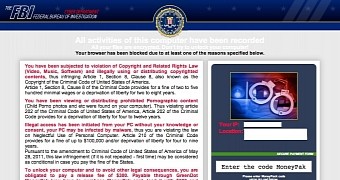A Russian man operating a ransomware scheme has been sentenced to three years in prison after pleading guilty to charges of conspiracy to commit money laundering, identity fraud and using a fictitious name and address in connection with the US mail.
The role of the fraudster (Aleksei Shushliannikov, 23) in the scheme was not a major one, but the operation he was part of was relatively large, as investigators found that together with a co-conspirator he laundered, or had the intention to do so, between $400,000 and $1 million (€360,000 / €908,000).
Fraudsters purchased MoneyPak codes from hackers
Other hackers would deploy a virus on the victims’ computers locking access to them until a ransom was paid by delivering codes for MoneyPak vouchers; these can be used to load cash on a prepaid card, making them as good as cash.
To increase the success rate, the fee posed as a fine from a law enforcement agency (FBI) as a result of allegedly finding illegal content on the victim’s system.
In order to cash in and avoid getting caught, the hackers sold the MoneyPak codes to Shushliannikov and a co-conspirator, who would apply for prepaid debit cards from the banks using personal information of other people, not involved in the scheme.
The cards would be dropped to mailboxes at addresses that looked unoccupied. According to information from DoJ, Shushliannikov sought houses in Massachusetts and New Hampshire, those with a “for sale” sign being particularly attractive.
1,100 prepaid cards were used in the operation
“Shushliannikov was discovered while removing mail from another person's mailbox in New Hampshire. His GPS linked him to other mail drop addresses used in the scheme,” DoJ informs.
At his apartment, the investigators found 246 prepaid debit cards, $26,000 / €23,600 in cash, and a money-counting machine. It appears that before being caught in February 2013, the two had opened about 1,100 prepaid cards.
The fraudster was part of this operation since December 2012 and he was charged in October 2013; the sentence came on Wednesday. Some of the laundered funds would get to accounts outside the United States, to other members of the criminal ring.

 14 DAY TRIAL //
14 DAY TRIAL //